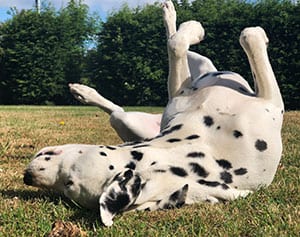Allergy season is right around the corner and while we know how bad our allergies can get during the springtime, your dog might be suffering too! Like humans, many different things can cause allergies in dogs. Unfortunately, you will certainly notice your dog sneezing or excessively itching but some allergies can be harder to identify. Not all dog allergies are seasonal either, some can have lasting effects on your pet.

Are There Different Types of Dog Allergies in the San Antonio Area?
Yes! Like humans, dogs can feel the effects of allergies in a variety of ways. Oftentimes, common allergens can affect each dog differently. They can have skin, respiratory, food, and sometimes, flea allergies.
Skin Allergies
Skin allergies, also known as allergic dermatitis, are often caused by environmental allergens in the San Antonio area. Common irritants are topical products such as shampoo or detergent but can also be caused by insect bites and household plants. They are the most common but luckily for dog owners, some of the easiest dog allergies to treat.
Respiratory Allergies
Respiratory allergies are caused by environmental factors and are often the allergies that are considered seasonal. Airborne allergens such as pollen, dust, smoke, and fragrances can affect dogs in similar ways to how they affect humans. Depending on the time of year, your dog may react to different plant pollen in different ways.
Food Allergies
Food allergies are a bit harder to notice and a lot less common. Only 10% of dogs develop allergies to food. Most food allergies are chronic and genetic, showing up early in your dog but some can appear later in your dog’s life, even if there has been no change to their diet.
Flea Allergies
Flea allergies are caused by flea saliva and although they might seem similar to skin allergies, the symptoms and treatment are quite different. They are often more prevalent in warmer months when fleas are more active. Regular flea bites cause itching but an allergy creates a prolonged, more severe reaction.
 What are Some Common Symptoms of Allergies in Dogs?
What are Some Common Symptoms of Allergies in Dogs?
Skin allergies are often the most noticeable dog allergies and can appear anywhere on a dog but especially at the base of their tail. If you notice your furry friend spending extra time biting at their tail, it may be time for a trip to the vet. Other signs of skin allergies to look out for include:
- redness and irritation
- scabs
- open wounds from excessive biting and chewing
- licking
Respiratory allergies can be frightening and it may seem like your dog is in distress. As with any allergies, please consult a veterinarian if you are concerned about your pet’s health. Symptoms of respiratory allergies can include:
- Sneezing and wheezing
- reverse sneezing
- runny nose
- watery, red eyes
Food allergies in the San Antonio area can also lead to itching and irritation on the skin and can cause scratching leading to hair loss and open wounds. Other symptoms of food allergies can include:
- gas
- vomiting
- diarrhea
- swelling of the face, lips, eyelids or ears
- ear infections
- paw infections
Flea allergies can be hard to differentiate from other common skin allergies. Some common signs to look out for are:
- Hair loss near the tail or hind legs
- Intense scratching for over two weeks
- Small red bumps or rashes in affected areas
Can My Dog’s Allergies Be Dangerous in the San Antonio Area?
Yes! Like humans, dogs can have acute allergic reactions that can result in anaphylaxis, hives, and severe face swelling. Although anaphylaxis is uncommon, it can be fatal and you should contact your vet immediately if you believe your dog is experiencing anaphylactic shock due to an allergy.
Other side effects of dog allergies that are not immediately life threatening but still dangerous are:
- weight loss
- hair loss
- difficulty breathing
- difficulty exercising
How Are Dog Allergies Diagnosed in the San Antonio Area?
Atopic allergens are inhaled and can result in skin and respiratory reactions. They can often be diagnosed with Radioallergosorbent blood tests. Other allergens may be identified through an elimination process. Whether it be removing certain shampoos one by one or changing up your dog’s diet, elimination may be a long process but the most cost-effective way to determine what is affecting your dog.
How Are Dog Allergies Treated?
Depending on the type of allergy your dog suffers from, your vet may opt to prescribe your medication to your dog. Medication can vary from medicated shampoo, antihistamine, antifungal to antibiotics. There are also several other remedies that can help limit your dog’s reaction to certain allergens in the San Antonio area.
Medicated Shampoo
Hypoallergenic and medicated shampoo can soothe the inflammation caused by skin allergies while sometimes removing the allergen itself from the dog’s coat and skin. Shampoos are commonly used to treat contact dermatitis. They can be beneficial in soothing flea allergies when coupled with flea preventative. When dog allergies cause excessive itching and licking, it can often lead to yeast infections. Antifungal shampoos and medication are the best course of action for treating your dog’s yeast infection.
Antihistamines
Antihistamines work quickly to reduce inflammatory reactions to allergens. They can be administered via injection or orally and many dogs even respond well to over-the-counter medications such as Benadryl or Zyrtec. You should always consult with a veterinarian for dosing recommendations before giving antihistamines to your dog.
Other Treatments
Other remedies for dog allergies include desensitization therapy and changing your dog’s diet and/or adding supplements to their meals. Desensitization therapy consists of allergy shots that are given to your dog on a regular basis. The shot consists of a small amount of the allergen that affects your dog and is designed to build up your dog’s tolerance. This remedy can be especially helpful for atopic allergies that cause respiratory symptoms. Changing your dog’s diet can be as easy as giving them limited ingredient food that is designed to cut out common ingredients that cause food allergies in dogs.
Our Animal Hospital is Here to Help!
Whether your dog’s allergies are mild or are more severe, dog allergies in the San Antonio area can affect your pet’s daily life and activity level and it is best to consult with your vet at Schertz Animal Hospital about diagnosing and treating the cause of your dog’s discomfort.
Call (210) 659-0345 with any questions and concerns you might have. We are here to help.
Recent Posts
About Us
We know that choosing the right veterinarian for your pet (and you) can be a challenge. Yet, with our stress-free handling, our long-term, experienced staff, and a state-of-the-art facility, we make the decision an easy one!
